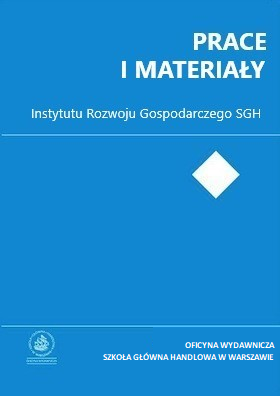Decyzje polityczne a cykl koniunkturalny w państwach inicjatywy wyszehradzkiej
##plugins.themes.bootstrap3.article.main##
Abstrakt
Celem opracowania jest przegląd wybranych badań empirycznych mających na celu stwierdzenie, czy dla państw Grupy Wyszehradzkiej można zaobserwować statystycznie istotną relację pomiędzy agregatami makroekonomicznymi a cyklem zmiany rządów. Stwierdzenie, czy i w jaki sposób czynniki polityczne wpływają w szczególności na zadłużenie państw Grupy Wyszehradzkiej może być istotne w obliczu kryzysu zadłużenia, z jakim w ostatnim czasie zmaga się Unia Europejska. Przeprowadzone badania wskazują, że w przypadku państw Grupy Wyszehradzkiej cykl polityczny może przyczyniać się do zadłużenia gospodarek.(abstrakt oryginalny)
##plugins.themes.bootstrap3.article.details##
Bibliografia
Alesina A., Drazen A., Why Are Stabilizations Delayed ?, “American Economic Review” 1991, vol. 81, no. 5
Alesina A., Perotti R., Fiscal Expansions and Fiscal Adjustments in OECD Countries, “Economic Policy” 1995, no. 21.
Alpanda S., Honig A., The impact of central bank independence on political monetary cycles in advanced and developing nations, Amherst College, 2009.
Blundell-Wignall A., Solving the Financial and Sovereign Debt Crisis in Europe, OECD Journal: Financial Market Trends, OECD 2012.
Brender A., Drazen A., Political Budget Cycles in New versus Established Democracies, “Journal of Monetary Economics” 2005, vol. 52, no. 7.
Burkovskaya A., Opportunistic Political Business Cycles in Monetary Policy and Central Bank Independence, Master Thesis, Russian School of Economics, Moscow 2011.
Čajka R., Impact of Political Cycles on Structural Deficits – Evidence From the Central European Countries, Department of International Trade, University of Economics, Prague, 2012.
Hibbs D.A., Political Parties and Macroeconomic Policy, “The American Political Science Review” 1977, vol. 71, no. 4.
International Monetary Fund, Data and Statistics.
Milani F., Political Business Cycles in the New Keynesian Model. “Economic Inquiry” 2010, vol. 48.
Nordhaus W.D., The Political Business Cycle, “Review of Economic Studies”1975, XLII.
Pensions Funds and the Crisis – National Policy Actions, Pensions Europe, June 2013.
Persson T., Tabellini G., Do Electoral Cycles Differ across Political Systems?, Universita Bocconi, 2003.
Persson T., Tabellini G., The Economic Effect of Constitutions: What do the Data Say?, MIT Press, Cambridge 2003.
Praščević A., Specifics of Political Macroeconomic Cycles in the Economies in Transition, w: Challenges of Globalization and Transition, University of Belgrade, 2007.
Rakner L., . Menocal A. R., Fritz V., Democratisation’s Third Wave and the Challenges of Democratic Deepening: Assessing International Democracy Assistance and Lessons Learned, The Advisory Board for Irish Aid, 2007.
Rogoff K., Sibert A., Elections and Macroeconomic Policy Cycles, “Review of Economic Studies” 1998, LV.
Roubini N., Sachs J., Government Spending and Budget Deficits in the Industrial Countries, “Economic Policy”1989, no. 8.
Słowacja, strukturalne uwarunkowania polityki gospodarczej, Ministerstwo Gospodarki, Departament Strategii i Analiz, Warszawa 2013.
The World Bank, Database of Political Institutions 2010.
Tökés T., Political Transition and Social Transformation in Hungary, “Afers Internationals” 1996, no. 34-35.
